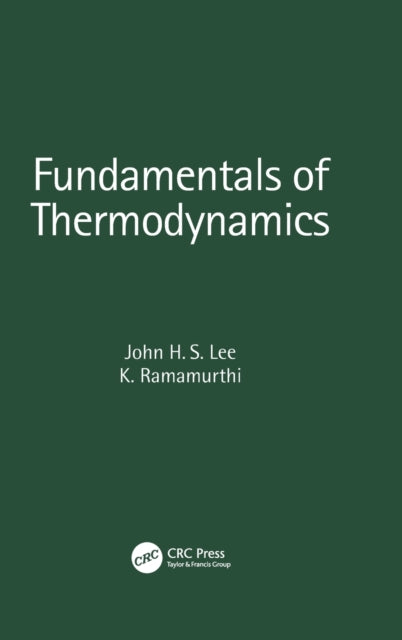John H. S.Lee,K.Ramamurthi
Fundamentals of Thermodynamics
Fundamentals of Thermodynamics
- Condition: Brand new
- UK Delivery times: Usually arrives within 2 - 3 working days
- UK Shipping: Fee starts at £2.39. Subject to product weight & dimension
Bulk ordering. Want 15 or more copies? Get a personalised quote and bigger discounts. Learn more about bulk orders.
Couldn't load pickup availability
- More about Fundamentals of Thermodynamics
Mechanical, thermal, and thermodynamic equilibrium are covered, along with the molecular basis for internal energy, entropy, thermodynamic equilibrium, and reversibility. It demonstrates entropy as a path-independent property and relates it to other areas, such as gas dynamics, combustion, propulsion, power plant engineering, and engines.
Format: Hardback
Length: 148 pages
Publication date: 27 January 2022
Publisher: Taylor & Francis Ltd
Mechanical, thermal, and thermodynamic equilibrium are fundamental concepts in physics that govern the behavior of systems. They are closely related to each other and play a crucial role in understanding the physical world. In this article, we will explore these concepts in detail and their applications.
Mechanical equilibrium refers to the state of a system in which there is no net force acting on it. This means that the forces acting on the system are balanced, and the system is in a state of rest or uniform motion. Mechanical equilibrium can be achieved in a variety of ways, such as by applying equal and opposite forces to a system or by using a balance beam to measure the weight of an object.
Thermal equilibrium, on the other hand, refers to the state of a system in which there is no net heat transfer between it and its environment. This means that the system and its surroundings are at the same temperature. Thermal equilibrium can be achieved by transferring heat between the system and its surroundings until they reach the same temperature.
Thermodynamic equilibrium is a combination of mechanical and thermal equilibrium. It refers to the state of a system in which there is no net change in its internal energy or entropy. This means that the system is in a state of thermodynamic equilibrium and is neither gaining nor losing energy. Thermodynamic equilibrium can be achieved by adjusting the parameters of a system, such as the pressure, temperature, and volume, until they reach a stable state.
The molecular basis for internal energy, entropy, thermodynamic equilibrium, and reversibility is an important concept in thermodynamics. Internal energy is the energy stored within a system, and it can be converted into different forms of energy, such as heat or work. Entropy is a measure of the disorder or randomness in a system, and it increases as the system approaches thermodynamic equilibrium. Thermodynamic equilibrium is achieved when the internal energy of a system is equal to its entropy. Reversibility is the ability of a system to return to its initial state after a change has been made to it.
Modeling irreversibility and determining the net loss in performance of a thermal system compared to an idealized system and approaching an ideal one are important applications of thermodynamics. Irreversibility is a fundamental property of the physical world, and it is caused by the second law of thermodynamics. The second law states that the entropy of a closed system always increases with time, regardless of the direction of the change. This means that a system that is in a state of thermodynamic equilibrium will eventually become more disordered and less efficient.
To model irreversibility, thermodynamicists use reversible heat engines and reversible heat pumps. A reversible heat engine is a device that converts heat into work or vice versa in a completely reversible manner. A reversible heat pump is a device that transfers heat between a system and its surroundings in a completely reversible manner. By interacting with a process between two states, the environment and the reservoir, reversible heat engines and heat pumps can demonstrate entropy as a path independent property.
Reversibility from a thermodynamics standpoint is important in many areas, such as gas dynamics, combustion, propulsion, power plant engineering, and engines. In gas dynamics, reversible engines are used to study the behavior of gases and their interactions with each other. In combustion, reversible engines are used to study the behavior of flames. In propulsion, reversible engines are used to study the behavior of fluids and their interactions with each other. In power plant engineering, reversible engines are used to study the behavior of power plants and their interactions with the environment. In engines, reversible engines are used to study the behavior of engines and their interactions with the environment.
In conclusion, mechanical, thermal, and thermodynamic equilibrium are fundamental concepts in physics that govern the behavior of systems. They are closely related to each other and play a crucial role in understanding the physical world. By exploring these concepts in detail and their applications, we can gain a deeper understanding of the physical world and its processes.
Weight: 463g
Dimension: 234 x 156 (mm)
ISBN-13: 9781032123127
This item can be found in:
UK and International shipping information
UK and International shipping information
UK Delivery and returns information:
- Delivery within 2 - 3 days when ordering in the UK.
- Shipping fee for UK customers from £2.39. Fully tracked shipping service available.
- Returns policy: Return within 30 days of receipt for full refund.
International deliveries:
Shulph Ink now ships to Australia, Belgium, Canada, France, Germany, Ireland, Italy, India, Luxembourg Saudi Arabia, Singapore, Spain, Netherlands, New Zealand, United Arab Emirates, United States of America.
- Delivery times: within 5 - 10 days for international orders.
- Shipping fee: charges vary for overseas orders. Only tracked services are available for most international orders. Some countries have untracked shipping options.
- Customs charges: If ordering to addresses outside the United Kingdom, you may or may not incur additional customs and duties fees during local delivery.


